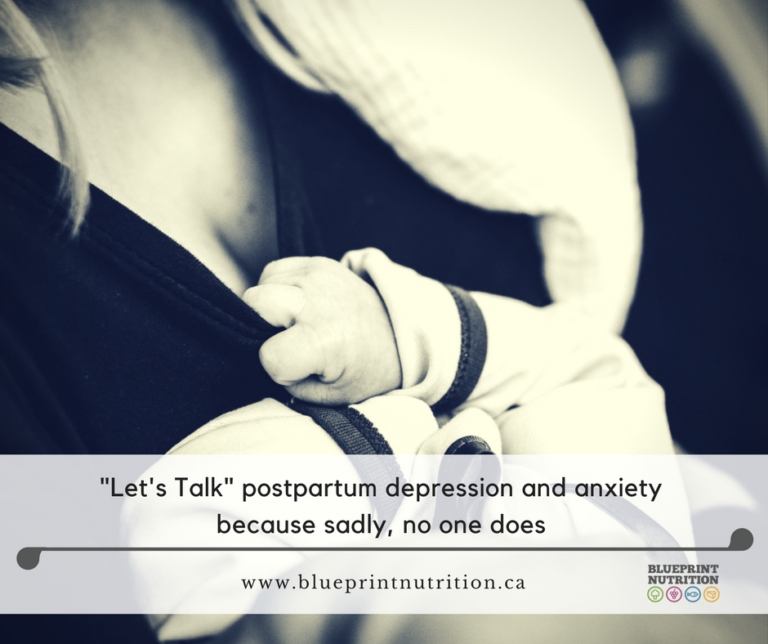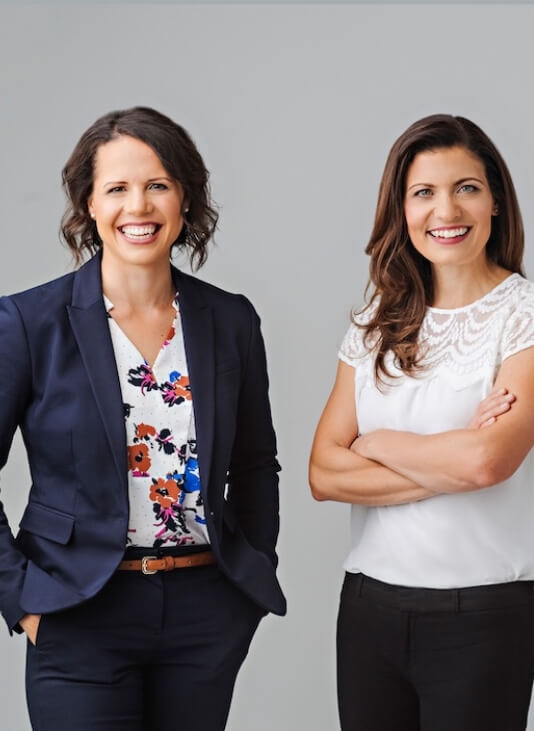…because sadly, no one does
It’s hard to believe that the end of January is just around the corner and with that comes Bell Let’s Talk day on January 31. In case you’re unfamiliar with Let’s Talk day, it really is an opportunity (born in the social media age) to encourage people to openly and honestly discuss struggles and challenges with mental health. In light of this upcoming opportunity to discuss mental health, I’m reaching out of my comfort zone and sharing my own mental health & postpartum depression story. Why do that on a nutrition blog? Glad you asked. My answers has three parts to it:
- I share because I am committed to breaking down the walls that surround mental health and overcoming the stigma attached to those who suffer from mental health issues.
- I share because my story directly relates to my job as a dietitian and an area of practice where I am often assisting new mothers with infant feeding.
- I share because I felt prompted to do so, knowing that this may be bring healing or hope to another new mom out there. To quote scripture “for when I am weak, then I am strong.”
My journey with postpartum depression (PPD) and postpartum anxiety (PPA) has two chapters – the first with my son, and the second with my daughter. There are far too many details to be able to share my story in it’s entirety but I will do my best to give you a taste for my journey and path to healing and recovery.
Chapter one. Baby one.
My story starts in 2012 when my husband and I welcomed our son into the world. Like most other first time parents holding their newborn, we were overcome with the deepest love for this tiny human being. Those first few minutes, hours and days were truly unforgettable.
With the vast knowledge of the benefits of breastfeeding cemented in my brain from my undergraduate days and my years practicing as a dietitian trained in pediatrics, I had my mind made up that my baby would be exclusively breastfed. I certainly wanted my child to receive the best nourishment and foundation for health and growth. Formula was not an option. Period.

Two days after delivery, my milk supply came in with such abundance (any other moms out there with this problem?!) and such a high flow. This, coupled with a tongue tie, which we didn’t know about at the time, meant that it didn’t take long for baby and I to get into some horrible problems with latch. Oh, that darn latch!! Although we seemed to be able to get a good latch when the midwife or lactation consultant was around, I just couldn’t do it on my own. Reflecting back now, this was likely in part due to sky high anxiety and stress. I hadn’t planned on breastfeeding being THIS difficult or frustrating. I thought it was supposed to be a natural and easy thing to do.
Fast forward a few weeks, and I found myself with cracked and bleeding nipples, a case of thrush for my son and mastitis for me. The prescription was gentian violet (which was a real mess) and an electronic breast pump for me. Now I was pumping to bottle-feed my baby breastmilk to allow the wounds to heal, pumping extra for the next feed and somehow trying to get him to sleep and find time to sleep myself before having to feed and pump in another 2-3 hours! Despite the fact that I had amazing support from my husband, family and friends, I became more and more sleep deprived as time went on. I was pumping instead of sleeping and our little one had a particularly hard time sleeping at night, waking almost hourly. But I kept telling myself, “what dietitian doesn’t breastfeed her baby? Giving up is NOT an option.”
“What dietitian doesn’t breastfeed her baby? Giving up is NOT an option.”
So, I kept pumping until everything healed and I could get him to latch, pain-free. Success … right?
The “success” cost me a lot. It cost me my sanity, my sleep, and my confidence in my ability to do this “parenting gig” and to keep this little human alive. Finally at 3 months we were breastfeeding “normally” but is it “normal” to kill yourself to get to that point? And these feelings I had of extreme fatigue, sadness and frustration were all “normal” parts of motherhood, right?
Once the feeding problems were solved there were still significant challenges with sleep to work through. Sleep deprivation is REAL!! The hourly waking at night was unsustainable. Co-sleeping was not an healthy option for me. By the time our son was 6 months we hired a sleep consultant (best money ever spent) and things improved 100-fold, but by this time, I felt so exhausted and wrung out like an old dirty dish cloth.
And now that we were finally feeding and sleeping well I didn’t want to venture far from home, lest we mess up the good thing we had going. So, we stayed in, only going out when he was awake and making sure we were always home for naps. I tried to attend mom groups but I didn’t have the capacity to put on a happy face when I felt like the ugly ducking that didn’t fit in with the rest.
I was clueless that what I was experiencing was postpartum depression, and I never got proper help or treatment. I figured this was a normal part of being a mom, especially after having gone through what we did.
Chapter two. Baby two.
Fast forward to our second baby, I was going to do everything right this time, especially with feeding and sleeping. But then a sequence of tragedies hit during our pregnancy: we found out that our daughter had a rare heart defect which could be associated with numerous genetic disorders and a few days later my mother-in-law passed away from brain cancer. We lived out the rest of the pregnancy grieving the loss of mom/grandma and filled with anxiety about our daughter’s health.

We couldn’t have been more relieved to welcome a healthy baby girl with a very special heart early in 2015. With no surgery necessary at this point, I could coast now, right? Things were going to be easier this time. I was an experienced parent now.
Unfortunately, the three botched epidurals during delivery led to loss of cerebral spinal fluid (CSF) in my spinal column which gave me a spinal headache and left me in extreme pain and bedridden for days after delivery until I could get a blood patch procedure to exterminate the headache. Then our little girl developed hemangiomas, one particularly concerning in her upper eyelid which necessitated trips to medical experts, medications and more things for this momma to worry about.
Feeding got off to a great start the first few days but then somehow fell apart again as my milk supply ferociously came in, leading to gagging and choking, sloppy latches and inadequate intake. All of this subsequently led to big drops in my supply, which prompted pumping again to get supply back up … rinse, wash, repeat the cycle over and over. It also didn’t help that I was trying to force a feeding and sleeping schedule on my little girl way too early, which I wouldn’t recommend! In the end, I decided to just pump milk and feed her via bottles until she was 12 months because feeding was too anxiety-provoking for me. Good plan eh?
And even though my little girl was a fantastic sleeper, the horrible memories of our first few months of sleep deprivation with our firstborn kept me awake for large portions of the nights, fearful that she too would wake repeatedly. Where did all this leave me? Tired from pumping, anxious over the medical issues and sleep and sad that my little girl would never be able to meet her paternal grandparents.
Then in early spring, one of our family members approached the topic with my husband of PPD/PPA and that it might be worthwhile getting assessed. At first I was flaming mad that this person dare suggest that I was “crazy”. After all I had been through, wouldn’t anyone find themselves in a similar state of mind? However, once I was humble enough to admit that I needed help (that took some time), I fell on my knees and surrendered to the truth that I certainly needed some help and something had to change.
What was “the thing” that really helped me? It wasn’t any one thing in particular but was a whole team of things, more specifically, people, who helped me break through the fog. My family doctor started me on anti-depressant/anxiety meds, I spent a few days away with my son at my parent’s farm (a place of respite and healing for me), I attended individual and group counselling sessions, shared my struggles with my women’s group at church who surrounded me in prayer and hired some amazing post-partum doulas who helped at home during the day while I got my feet underneath me again.
And in the end, a significant portion of my healing came from stopping the breastfeeding/pumping and switching to formula. Truth be told, I balled the first time I fed my little girl a bottle around 3-4 months of age but each time I did it, it got easier. How can you heal when you’re a slave to a pump and just unable to fathom going back to feedings at the breast? Were the nutritional benefits of breastfeeding more important then my mental health? First time around I would have said yes. This time, I knew that was a lie and that my girl was better off on formula.
“Were the nutritional benefits of breastfeeding more important then my mental health? First time around I would have said yes. This time, I knew that was a lie…”
Chapter three. Learnings.
Although I would never have wished this journey on myself, I certainly learned a lot about myself and have become a much stronger and more compassionate person because of it, and I think, a better dietitian as well. It’s amazing how your outlook changes once you have “walked the walk” yourself.
So what did I learn?
I am not alone, and you are not alone either. Postnatal blues (aka baby blues) affect 15-80% of women in the 10 days following birth. The stats surrounding PPD/PPA vary, depending on what source you read, but somewhere between 13-20% seems reasonable. In all likelihood, there are other moms in your circle who have journeyed down this path. I also learned that women with a history of depression are 2-3 times more likely to experience postpartum depression then women without a history. So, my experience that went untreated with my son set me up quite nicely for a repeat performance with my daughter, not even considering the other triggers.
Breastfeeding has the potential to be A LOT of work and while you sometimes need to just push through temporary obstacles, pumping for months on end is likely not a healthy solution. Studies demonstrate that breastfeeding can protect mothers from postpartum depression, but there is also data to show that breastfeeding problems, on their own, or with other simultaneous physical health symptoms, are significant factors related to poorer maternal mood in the early postpartum. As health care providers, we need to be aware of the mental health struggles associated with breastfeeding and support moms in choosing whichever method of feeding suits both mom and babe best.
Formula-feeding can be just as beautiful as breastfeeding and does not make you a “lesser” mother. It’s fantastic to see breastfeeding promoted a lot more and I certainly do not want to stop the efforts to encourage moms to breastfeed (there are SO MANY benefits and I am SO GLAD that I was able to do it for my children), but we must balance the messages being given. In the end, fed is best.
Sleep deprivation profoundly impacts PPD/PPA. Getting a friend, sister or mom to do an occasional night shift to allow you to sleep is a great option. Although infant sleep consultants are not part of a regulated health care field, getting help from one who has a gentle approach was a key piece to the puzzle for me. Many of the baby books on sleep with their sophisticated formulas do nothing but make you feel like something is wrong with you or your child. My best advice, don’t read them or if you have them, burn them.
Perfectionistic tendencies, the desire for ultimate control and perfectly timed schedules are best left at the door before you enter into the journey of motherhood. This is hard for those of us with “type-A” personalities or who like schedules. There is a happy medium where your baby’s needs meet your own needs and when you find that place it is magic. It takes time though and forcing your previous life on your baby will likely not end well.
Parenting is the hardest job in the world and I need to lean more on my faith because my strength alone is insufficient for this mighty task!
And just in case you were wondering if any dietary supplements prevent against postpartum depression… The last Cochrane Systematic Review in 2013 did not find that any dietary supplements were able to prevent PPD if taken prenatally, including DHA, EPA or selenium but some more recent research on probiotics – specifically L. rhamnosus – did show that it might help to decrease the incidence. There is a lot more to learn in this area so stay tuned!
Take it one bite at a time,
Rosanne
If you enjoyed this article and found it helpful, I recommend checking out Making Change Happen for more useful information.
References:
- Figueirdeo B et al. Breastfeeding and postpartum depression: state of the art review. J Pediatr, 89(4): 332-338. 2013.
- Conklin AR et al. Physical health, breastfeeding problems and maternal mood in the early postpartum: a prospective cohort study. Arch Womens Ment Health, 2017.
- Lewis BA et al. The effect of sleep pattern changes on postpartum depressive symptoms. BMC Womens Health, 18(1): 12. 2018.
- Cochrane Database Syst Rev. Dietary supplements for preventing postnatal depression. 2013.
- Slykerman RF et al. Effect of Lactobacillus rhamnosus HN001 in pregnancy on postpartum symptoms of depression and anxiety: A randomized double-blind placebo-controlled trial. E Bio Medicine, 24: 159-165. 2017.






